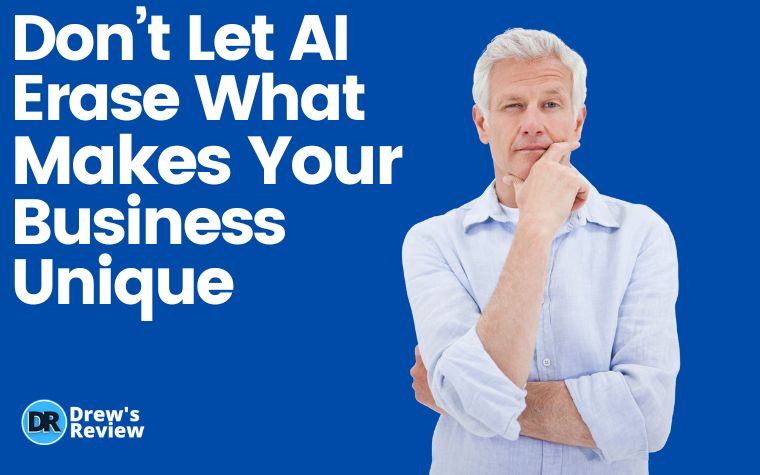
Not long ago, there were plenty of bold claims that artificial intelligence was going to replace entire workforces. People were saying that software would code for itself, machines would handle customer service, and automation would take care of everything in between. While AI has made huge strides, the truth is that it has not replaced human workers. What it has done is change the way businesses operate.
There is no denying that AI tools can make your business faster and more efficient. They can help with research, automate repetitive tasks, and even generate ideas. But none of that matters if you lose what makes your business unique. Personality, creativity, and authenticity still have to come from you. That’s what customers connect with, and that’s what makes a brand last.
Building Your Idea Without Losing Yourself
When you are first starting out, it is tempting to lean on AI tools to tell you what kind of business to build. You can type in a few prompts, and in seconds, you get lists of trending industries, suggested niches, and even sample mission statements. That can be helpful as background research, but you should never let AI dictate what your business becomes.
The foundation of your company has to come from you. It has to reflect your values, your passions, and the problems that you want to solve for your customers. This is where having a solid business plan comes in. A real plan forces you to think about who you want to be, what makes you different, and why people should choose you over anyone else.
AI can give you data, but it cannot give you personality. If you let automation define your business from the ground up, you risk ending up with something generic and forgettable. Use AI as a tool to support your thinking, but keep the vision and direction firmly in your own hands. That’s the only way to build a business that feels authentic and stands out in a crowded market.

Marketing in the Age of AI
Marketing is one of the areas where AI tools are having the biggest impact. They can optimize ad targeting, track customer behavior, and even generate email subject lines in seconds. That’s useful, but here’s the problem: if you hand over your marketing completely to AI, your content starts to look and sound like everyone else’s. The personality that makes your business special gets lost in generic posts and cookie-cutter campaigns.
Think about it this way. A machine can tell you what keywords are trending or which colors attract clicks, but it cannot tell your story. Customers connect with stories, with emotion, and with the voice that only you can provide. That’s why the smartest approach is not to choose between humans and AI, but to combine them.
This is exactly the point made in an AI-driven marketing strategy by Matthew Bertram. Let AI handle the data-driven tasks, but let humans control the storytelling. Automate the repetitive processes, but keep your creativity at the center. That balance ensures you can take advantage of AI’s efficiency without sacrificing the personality that makes your brand unique.
Customer Experience: Efficiency vs. Empathy
AI is changing customer service in a big way. Chatbots can answer basic questions, track orders, and handle simple requests at any time of day. That saves money and gives customers quick answers, which is great. But if you have ever been stuck talking to a bot that doesn’t understand your problem, you know how frustrating it can be. Efficiency is good, but empathy is what keeps customers loyal.
People want to feel heard, and that requires a real person. A human can pick up on tone, understand frustration, and offer solutions that are not in a script. They can also follow up later to make sure the problem was actually solved. That is what builds trust.
Businesses that rely only on AI risk looking cold and uncaring. A balance works best. Let AI take care of the easy questions so your team has more time to focus on complex issues. By keeping humans in the loop, you protect your reputation, reduce negative reviews, and make sure customers see the personality behind your brand instead of just another faceless system.
Programming and AI: When Human Ingenuity Matters Most
There has been a lot of hype about how AI can write code. Some businesses even think they can replace their programming teams with tools that generate functions automatically. On the surface, it looks like a time saver. But the reality is very different.
A recent study found that developers using AI actually took 19% longer to complete tasks compared to those who did not use it, even though they expected the opposite. They thought AI would save them almost a quarter of their time, but the results showed otherwise. Accuracy is another major issue. Research has shown that about 45% of AI-generated code contains security vulnerabilities, from small inefficiencies to serious flaws that can expose entire applications.
This is why human programmers are still essential. They bring the creativity, the problem-solving skills, and the ability to think through complex issues that AI simply cannot handle. AI can suggest ideas or help with repetitive parts of coding, but it cannot replace human ingenuity. If you want safe, effective, and innovative software, you need people at the heart of the process.
AI has changed the way businesses operate, and there is no doubt that it can save time and open new opportunities. From research to marketing, from customer service to programming, these tools can make your life easier. But what AI cannot do is give your business a personality. It cannot decide what you stand for, it cannot share your story, and it cannot connect with customers on an emotional level. That part is up to you.
Conclusion
The businesses that succeed in a high-tech world are the ones that use AI as a helper, not a replacement. Keep the efficiency, but never forget the human touch. Your creativity, your vision, and your authenticity are what people remember and what make your brand unique.
- All About Optimizing Healthcare SEO with E-E-A-T - February 12, 2026
- How Technology Is Empowering AI-Driven Enterprises Today - February 5, 2026
- Best Digital Advertising & Marketing Agencies in Calgary - February 2, 2026
